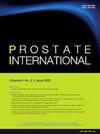Comparative adverse event profiles of triplet therapy versus docetaxel-based therapy in patients with metastatic prostate cancer: a multicenter retrospective study
IF 2.6
2区 医学
Q2 UROLOGY & NEPHROLOGY
引用次数: 0
Abstract
Background
To compare adverse event (AE) profiles between patients with prostate cancer receiving triplet therapy (docetaxel, androgen receptor signaling inhibitors [ARSIs], and androgen deprivation therapy [ADT]) and those receiving docetaxel-based therapy (docetaxel and ADT). Additionally, we sought to identify risk factors for severe AEs associated with these treatment regimens.
Materials and methods
In this retrospective, multicenter study, we included 359 patients diagnosed with metastatic castration-sensitive prostate cancer (mCSPC) or metastatic castration-resistant prostate cancer (mCRPC) who were treated with docetaxel. We analyzed patient demographics, hematologic and non-hematologic AEs, and risk factors for severe AEs. Logistic regression models were used to assess risk factors.
Results
There were no significant differences in the incidence of ≥ grade 3 neutropenia or febrile neutropenia (FN) between the triplet and docetaxel-based therapy groups when stratified by the use of primary prophylaxis. Non-hematologic AEs, especially fatigue, were more frequent in the mCRPC group compared to the triplet therapy group. Primary prophylaxis with granulocyte colony-stimulating factor (G-CSF) significantly reduced the risk of severe neutropenia (odds ratio [OR] 0.092, P < 0.001) and FN (OR 0.13, P = 0.007).
Conclusion
This study represents the first real-world analysis comparing the adverse event profiles of triplet therapy and docetaxel-based therapy in Japanese patients with mCSPC, as well as docetaxel-based therapy in those with mCRPC. No significant difference in severe AEs was observed between the therapies. Primary prophylaxis with G-CSF proved critical in reducing severe neutropenia and FN, underscoring its importance in enhancing the safety and efficacy of docetaxel-based therapies.
转移性前列腺癌患者三联疗法与多西他赛治疗的不良事件对比:一项多中心回顾性研究
比较前列腺癌患者接受三联治疗(多西紫杉醇、雄激素受体信号抑制剂[ARSIs]和雄激素剥夺治疗[ADT])和多西紫杉醇为基础的治疗(多西紫杉醇和ADT)的不良事件(AE)概况。此外,我们试图确定与这些治疗方案相关的严重不良事件的危险因素。材料和方法在这项回顾性、多中心研究中,我们纳入了359例诊断为转移性去势敏感前列腺癌(mCSPC)或转移性去势抵抗性前列腺癌(mCRPC)的患者,这些患者接受了多西紫杉醇治疗。我们分析了患者的人口统计学特征、血液学和非血液学ae以及严重ae的危险因素。采用Logistic回归模型评估危险因素。结果三联组和多西他赛治疗组的≥3级中性粒细胞减少症或发热性中性粒细胞减少症(FN)发生率在一级预防分层时无显著差异。非血液学不良事件,特别是疲劳,在mCRPC组比三联治疗组更频繁。初级预防使用粒细胞集落刺激因子(G-CSF)可显著降低严重中性粒细胞减少的风险(优势比[OR] 0.092, P <;0.001)和FN (OR 0.13, P = 0.007)。本研究首次对日本mCSPC患者的三联疗法和多西他赛为基础的治疗以及mCRPC患者的多西他赛为基础的治疗进行了实际分析。两组间严重不良事件发生率无显著差异。G-CSF的初级预防被证明对减少严重中性粒细胞减少症和FN至关重要,强调了其在提高多西他赛治疗的安全性和有效性方面的重要性。
本文章由计算机程序翻译,如有差异,请以英文原文为准。
求助全文
约1分钟内获得全文
求助全文
来源期刊

Prostate International
Medicine-Urology
CiteScore
4.40
自引率
26.70%
发文量
40
审稿时长
35 days
期刊介绍:
Prostate International (Prostate Int, PI), the official English-language journal of Asian Pacific Prostate Society (APPS), is an international peer-reviewed academic journal dedicated to basic and clinical studies on prostate cancer, benign prostatic hyperplasia, prostatitis, and ...
 求助内容:
求助内容: 应助结果提醒方式:
应助结果提醒方式:


